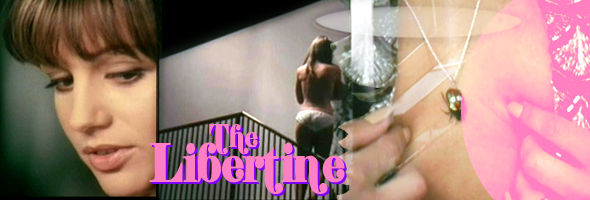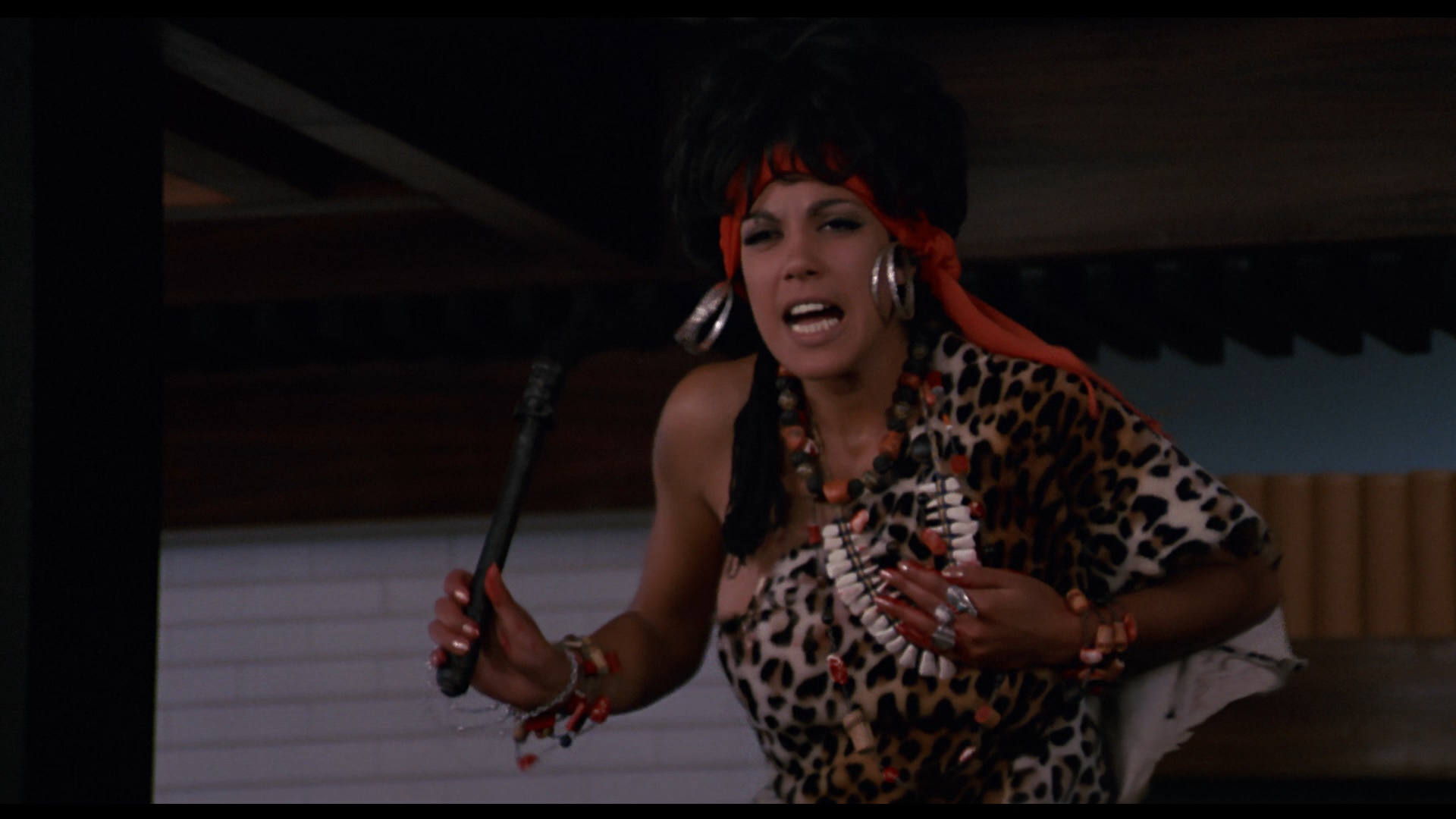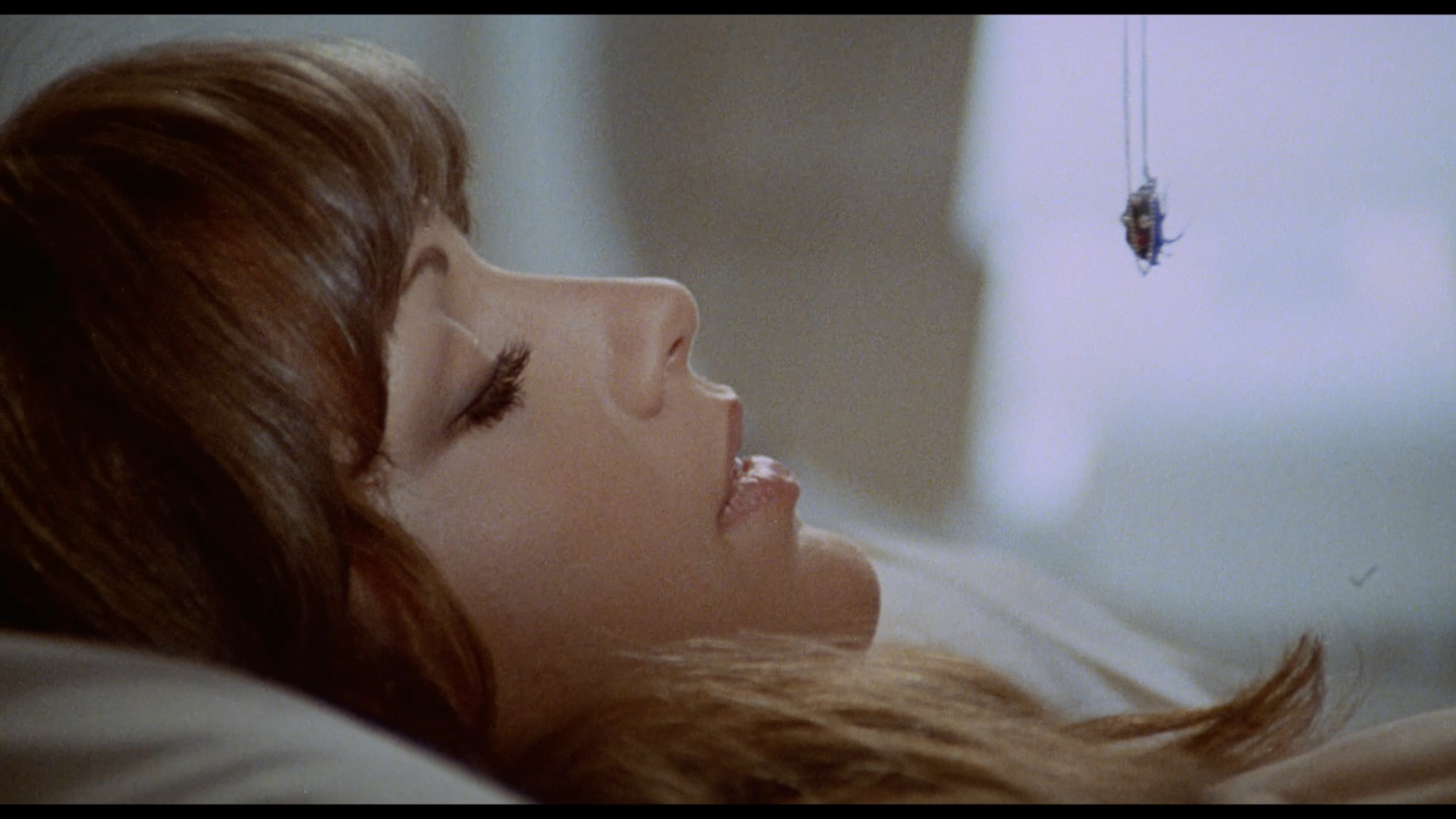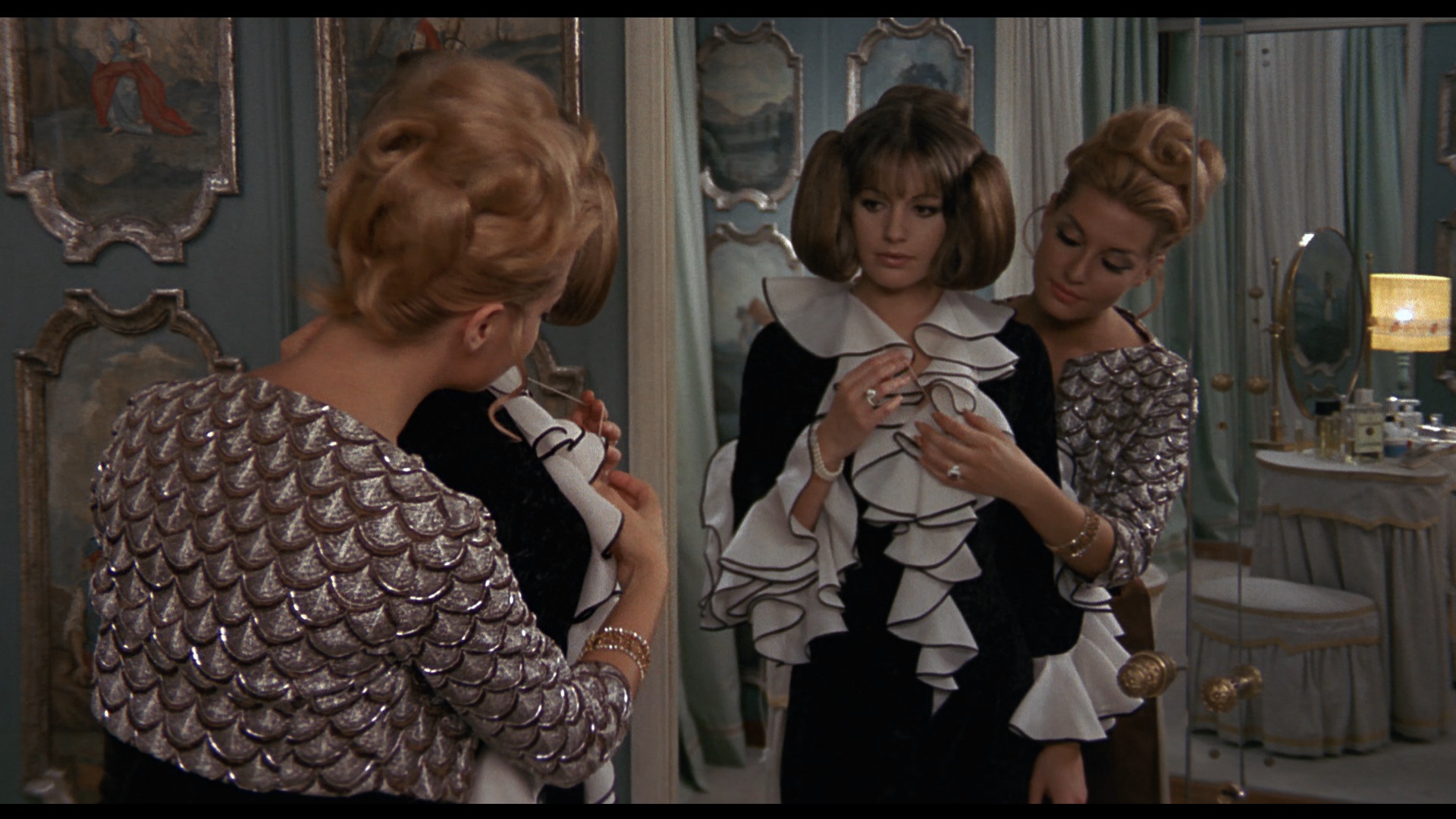

Color, 1969, 94 mins. 25 secs. / 94 mins. 16 secs.
Directed by Pasquale Festa Campanile
Starring Catherine Spaak, Jean-Louis Trintignant, Gigi Proietit, Luigi Pistilli, Philippe Leroy, Gabriele Tinti, Frank Wolff, Fabienne Dali, Venantino Venantini
Nucleus Films (Blu-ray) (UK RB HD),
M6 Video (France R2 PAL), Happinet (Blu-ray & DVD) (Japan RA/R1 HD/NTSC), King Records (DVD) (Japan R1 NTSC) / WS (1.85:1) (16:9), First Run Features (DVD) (US R0 NTSC) / WS (1.85:1)
 fun as a root canal, but here's a very welcome exception. Produced at the height
fun as a root canal, but here's a very welcome exception. Produced at the height  of groovy op art mania, The Libertine (La matriarca) is a bubbly, enchanting meditation on the foibles of the human libido as seen through the eyes of Mimi (Catherine Spaak at her loveliest), an unlikely and wealthy young widow who - thanks to the advice of her lecherous attorney - discovers her husband kept a swanky sex pad on the other side of town where he indulged in all manner of perverse sex play. Jealous and more than a little intrigued, Mimi picks up a copy of Psychopathia Sexualis and decides to dabble a bit in alternative lifestyles. After being mistaken for a hooker by a randy stranger (Black Emanuelle star Gabriele Tinti), tangling with an oddball dentist (Frank Wolff), and discovering the sexual side of living beetle necklaces, Mimi finally sets her sights on a sweet natured X-ray specialist (Jean-Louis Trintignant). Along the way she also learns the real cause of her random sneezing fits and discovers her own oddball perversion, which resolves itself in a most unusual and charming fashion.
of groovy op art mania, The Libertine (La matriarca) is a bubbly, enchanting meditation on the foibles of the human libido as seen through the eyes of Mimi (Catherine Spaak at her loveliest), an unlikely and wealthy young widow who - thanks to the advice of her lecherous attorney - discovers her husband kept a swanky sex pad on the other side of town where he indulged in all manner of perverse sex play. Jealous and more than a little intrigued, Mimi picks up a copy of Psychopathia Sexualis and decides to dabble a bit in alternative lifestyles. After being mistaken for a hooker by a randy stranger (Black Emanuelle star Gabriele Tinti), tangling with an oddball dentist (Frank Wolff), and discovering the sexual side of living beetle necklaces, Mimi finally sets her sights on a sweet natured X-ray specialist (Jean-Louis Trintignant). Along the way she also learns the real cause of her random sneezing fits and discovers her own oddball perversion, which resolves itself in a most unusual and charming fashion.
 cast at first, as he doesn't even enter the film until the third act and seems way too buttoned down, but fortunately he and Spaak prove to be able sparring partners for the
cast at first, as he doesn't even enter the film until the third act and seems way too buttoned down, but fortunately he and Spaak prove to be able sparring partners for the  delicious final scenes, worthy of a classic screwball comedy. Their expressions during the film's post-credits fadeout are simply priceless. This is also a chance to see a huge roster of recognizable European stars drifting through the story to indulge in the lighthearted kinky shenanigans, which put this as one of the sunnier entries in a cycle of domination and submission films from the era like The Slave (made by this film's director, Pasquale Festa Campanile, just after this one) and the masterpiece to rule them all, The Frightened Woman.
delicious final scenes, worthy of a classic screwball comedy. Their expressions during the film's post-credits fadeout are simply priceless. This is also a chance to see a huge roster of recognizable European stars drifting through the story to indulge in the lighthearted kinky shenanigans, which put this as one of the sunnier entries in a cycle of domination and submission films from the era like The Slave (made by this film's director, Pasquale Festa Campanile, just after this one) and the masterpiece to rule them all, The Frightened Woman.  other Audubon titles. A French DVD later followed in 2018 (under the title L'amour à Cheval), looking fairly solid and featuring the Italian and French tracks (with optional French subtitles) as well as the French trailer and the outtake reel.
other Audubon titles. A French DVD later followed in 2018 (under the title L'amour à Cheval), looking fairly solid and featuring the Italian and French tracks (with optional French subtitles) as well as the French trailer and the outtake reel.  gave the film its English-friendly Blu-ray debut as a stacked special edition featuring pretty much everything you could possibly want. The disc contains both the Italian version (94m25s), with Italian and English audio (the former sounding much better but the latter more in sync, with optional English subtitles) and the spicier Audubon version (which features a reworked dub track supervised by Radley Metzger), in English or Italian with optional English SDH or English translated subtitles. The two versions are presented as separate encodes with the Italian version getting a higher bit rate, occupying 25.1GB of the disc versus the Audubon's 14GB. However, in motion they're very similar with identical color timing and detail levels. The packaging notes the film has been "restored from the best available elements," and while this is hands down the best it's looked on video video by a wide margin, it still has issues in keeping with the somewhat tattered history of this film over the years and its current state. The detail level here is quite soft with some obvious filtering (especially the first reel) which appears to have been applied to mitigate damage, including attempts to spackle over some tears and warping on some frames that can still be partially seen if you're paying attention; also there's a visible image shift for a frame or two at each edit, which will take some getting used to especially on larger displays and projectors. Interestingly, as the film goes along it looks more natural with more film grain and minor debris in evidence, so who knows? Complicating matters is the fact that the film deploys varying types of filters and varying film stocks throughout (including some fairly aggressive diffusion on some shots of Spaak), which becomes even more apparent in HD. The colors look gorgeous here and really make the film a delightfully splashy experience, which makes the difficulty of finding much of Campanile's other work even more frustrating. The Italian version can also be played with a new audio commentary by Kat Ellinger, who really bores into Campanile (not just as a director) including his gravitation to comedy and the themes of
gave the film its English-friendly Blu-ray debut as a stacked special edition featuring pretty much everything you could possibly want. The disc contains both the Italian version (94m25s), with Italian and English audio (the former sounding much better but the latter more in sync, with optional English subtitles) and the spicier Audubon version (which features a reworked dub track supervised by Radley Metzger), in English or Italian with optional English SDH or English translated subtitles. The two versions are presented as separate encodes with the Italian version getting a higher bit rate, occupying 25.1GB of the disc versus the Audubon's 14GB. However, in motion they're very similar with identical color timing and detail levels. The packaging notes the film has been "restored from the best available elements," and while this is hands down the best it's looked on video video by a wide margin, it still has issues in keeping with the somewhat tattered history of this film over the years and its current state. The detail level here is quite soft with some obvious filtering (especially the first reel) which appears to have been applied to mitigate damage, including attempts to spackle over some tears and warping on some frames that can still be partially seen if you're paying attention; also there's a visible image shift for a frame or two at each edit, which will take some getting used to especially on larger displays and projectors. Interestingly, as the film goes along it looks more natural with more film grain and minor debris in evidence, so who knows? Complicating matters is the fact that the film deploys varying types of filters and varying film stocks throughout (including some fairly aggressive diffusion on some shots of Spaak), which becomes even more apparent in HD. The colors look gorgeous here and really make the film a delightfully splashy experience, which makes the difficulty of finding much of Campanile's other work even more frustrating. The Italian version can also be played with a new audio commentary by Kat Ellinger, who really bores into Campanile (not just as a director) including his gravitation to comedy and the themes of  gender and
gender and  agency at play here, plus extensive discussion of Spaak's career up to this point (coming out of a sexually coquettish period) and the fantasy role playing that ties into the general zeitgeist of European cinema at the time.
agency at play here, plus extensive discussion of Spaak's career up to this point (coming out of a sexually coquettish period) and the fantasy role playing that ties into the general zeitgeist of European cinema at the time. Nucleus Films (Blu-ray) (U.K.)
First Run (DVD) (U.S.)
M6 (DVD) (France)
![]()